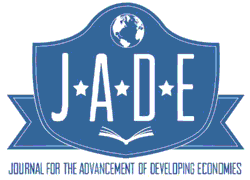Institute for the Advancement of Developing Economies

Journal for the Advancement of Developing Economies
Date of this Version
2019
Document Type
Article
Citation
Journal for the Advancement of Developing Economies 2019, Volume 8, Issue 1. ISSN:2161-8216
doi 10.32873/unl.dc.jade811
Abstract
This study, employing descriptive statistics and the Endogenous Switching Model, examined the link between credit constrained condition and agricultural productivity of rural households in Nigeria. Findings show that under credit constrained condition, education, labour, technology and other production inputs were not optimally utilized by the households. Credit constrained households had lower productivity than a random household from the sample would have had. However, in credit constrained households, being a male-headed household implied higher productivity. On the other hand, high value of assets and cost of hired labour had negative effects on productivity, while level of education and access to information had no significant effects. The study thus recommended intensification of efforts at ensuring the formulation of rural credit policies that will provide access to a reasonable amount of credit to rural households to secure required farm inputs, while formal credit institutions should diversify their loan scheme to incorporate different financial needs of the households.
Included in
Econometrics Commons, Growth and Development Commons, International Economics Commons, Political Economy Commons, Public Economics Commons, Regional Economics Commons

